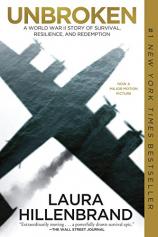Reading Group Guide
Discussion Questions
Unbroken: A World War II Story of Survival, Resilience, and Redemption

1. Louie’s experiences are singular: None of us is going to be in a plane crash, strafed by a bomber, attacked by sharks, cast away on a raft or held as a POW. And yet the word most often used to describe him is “inspiring.” What does Louie’s experience demonstrate that makes him so inspirational to people who will never endure what he did? What are the lessons that his life offers to all of us?
2. Is Louie a hero? How do you define heroism?
3. In Louie’s boyhood, he was severely bullied, then became a delinquent and hellraiser. In these experiences, did he already display attributes that would help him survive his wartime ordeal? Did he also show weaknesses or tendencies that foreshadowed the struggles he would face postwar?
4. Did Louie’s athletic career help prepare him for what he would face in war?
5. Louie was especially close to his brother Pete, who devoted himself to him. If Pete hadn’t been there, what would have become of Louie? Does Pete deserve credit for shaping Louie into a man who could endure and survive his Odyssean ordeal?
6. Hillenbrand explores the extraordinary risks faced by America’s WWII airmen: 54,000 men killed in combat, 36,000 killed in noncombat aircraft accidents and a stunning 15,000 men killed in stateside training --- at times, an average of 19 per day. Men faced a 50% chance of being killed during combat tours of only 30-40 missions. Were you aware of the dangers faced by airmen in the Pacific war? What facts and stories were most surprising to you?
7. What are your feelings about Mac? Do you feel sympathy for him? Anger? If you endured the trauma of a plane crash, and were placed in a situation that you knew very few men survived, might you have reacted as he did? In the end, did he redeem himself?
8. When Louie, Phil and Mac were on the raft, a key factor in their survival was optimism. All three men were young and able-bodied, veterans of the same training, experiencing the same hardships and traumas, yet Louie and Phil remained optimistic while Mac was hopeless, seemingly doomed by his pessimism. Why are some people hopeful, and others not? How important is attitude and mindset in determining one’s ability to overcome hardship?
9. What did you find most remarkable about the things Louie and Phil did to survive on the raft?
10. Over 47 days on the raft, the men lost half their body weight, and were rendered mere skeletons. Yet they refused to consider cannibalism, which had not been uncommon among castaways before them. Would you, in the same situation, ever consider cannibalism? If it could ensure that two men survived, when otherwise all three would almost certainly perish, would it be a moral decision?
11. Louie believed he was the beneficiary of several miracles, among them his escape from the wreckage of his plane, the fact that he and the other men were not hit with bullets when their rafts were strafed and the appearance of the singers in the clouds. What is your interpretation of those experiences?
12. The POWs took enormous risks to carry out thefts, sabotage and other acts of defiance. Men would risk their lives to steal items as trivial as pencil boxes. What benefit did they derive from defiance that was worth risking death, or severe beatings?
13. In the 1930s and 1940s, Germany and Japan carried out what are arguably the worst acts of mass atrocity in history. What leads individuals, and even whole societies, to descend to such a level? What motivated the notoriously sadistic POW camp guards in Japan, particularly the Bird? Do we all carry the capacity for cruelty?
14. After the war, Louie would say that of all the horrors he witnessed and experienced in the war, the death of the little duck, Gaga, was the worst. Why was this event especially wrenching for him and the other POWs?
15. Louie, Frank Tinker and William Harris planned to escape from Ofuna, walk across Japan, steal a boat and make a run for China. It was an attempt that very likely would have ended in their deaths. Was it foolish, or did it offer a psychological benefit that was worth the enormous risk?
16. Louie joined a plot to kill the Bird. Was he justified in doing so? Would it have been a moral act? Do you think Louie could have found peace after the war, had he killed the Bird?
17. UNBROKEN reveals that, under the “kill-all order,” the Japanese planned to murder all POWs, a plan that was never carried out because of the dropping of the atomic bombs. The book also explores the lengths to which the Japanese were prepared to go to avoid surrender. How did the book make you feel about America’s use of the atomic bomb on Japan?
18. “Anger is a justifiable and understandable reaction to being wronged, and as the soul’s first effort to reassert its worth and power, it may initially be healing,” Laura Hillenbrand wrote in an article for Guideposts magazine. “But in time, anger becomes corrosive. To live in bitterness is to be chained to the person who wounded you, your emotions and actions arising not independently, but in reaction to your abuser. Louie became so obsessed with vengeance that his life was consumed by the quest for it. In bitterness, he was as much a captive as he’d been when barbed wire had surrounded him.” Do you agree?
19. Many of us struggle to forgive those who have wronged us, but forgiveness is often so difficult to find. What makes it so hard to let resentment go?
20. “What the Bird took from Louie was his dignity; what he left behind was a pervasive sense of helplessness and worthlessness,” Hillenbrand continued in her Guideposts article. “As I researched Louie’s life, interviewing his fellow POWs and studying their memoirs and diaries, I discovered that this loss of dignity was nearly ubiquitous, leaving the men feeling defenseless and frightened in a world that had become menacing. The postwar nightmares, flashbacks, alcoholism and anxiety that were endemic among them spoke of souls in desperate fear. Watching these men struggle to overcome their trauma, I came to believe that a loss of self-worth is central to the experience of being victimized, and may be what makes its pain particularly devastating.” Do you agree?
21. Hillenbrand wrote that among the former POWs she interviewed, forgiveness became possible once the POW had found a way to restore his sense of dignity. Was this what Billy Graham gave to Louie? If so, what was it about that experience, and that sermon, gave Louie back his self-worth?
22. Do Louie Zamperini’s wartime and postwar experiences give you a different perspective on a loved one who was, or is, a veteran?
23. Why has most WWII literature focused on the European war, with so little attention paid to the Pacific war?
Unbroken: A World War II Story of Survival, Resilience, and Redemption
- Publication Date: November 4, 2014
- Genres: Biography, History, Nonfiction
- Paperback: 528 pages
- Publisher: Random House Trade Paperbacks
- ISBN-10: 081298711X
- ISBN-13: 9780812987119








